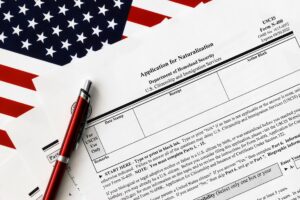Operation Janus may revoke the citizenship of thousands of people, according to the Department of Homeland Security, some of whom have been U.S. citizens for decades.
The Department of Justice (DOJ) announced Tuesday that a judge from the U.S. District Court for the District of New Jersey “entered an order” canceling a person’s naturalization certificate, revoking his citizenship and reverting him to a lawful permanent resident. The move potentially makes him subject to deportation.
Baljinder Singh, also known as Davinder Singh, is the first casualty of “Operation Janus,” a joint operation by the DOJ and U.S. Citizenship and Immigration Services (USCIS). It appears that because USCIS failed to use fingerprint records effectively, those who have been granted citizenship without proper fingerprint records, meaning before fingerprints were digitized, may now be subject to having their citizenship revoked.
Operation Janus began because USCIS granted citizenship to “at least 858 individuals ordered deported or removed under another identity when, during the naturalization process, their digital fingerprint records were not available,” according to a document released by the Department of Homeland Security’s (DHS) Office of Inspector General, in September 2016. “The digital records were not available because although USCIS procedures require checking applicants’ fingerprints against both the Department of Homeland Security’s and the Federal Bureau of Investigation’s (FBI) digital fingerprint repositories, neither contains all old fingerprint records. Not all old records were included in the DHS repository when it was being developed.”
Operation Janus may revoke the citizenship of thousands of people, according to DHS. These are people who will have been U.S. citizens for decades.
Immigration and Customs Enforcement (ICE) claims to have identified nearly 150,000 older fingerprint records “of aliens with final deportation orders or who are criminals or fugitives” that have not been digitized. The FBI repository is missing records because “not all records taken during immigration encounters were forwarded to the FBI,” DHS reported. Operation Janus identified 315,000 cases in which people were granted citizenship without the proper fingerprint data available, and USCIS intends “to refer approximately an additional 1,600 for prosecution,” the DOJ reported.
The DOJ is asserting, according to its Tuesday statement, that cases in which proper fingerprint data is missing may suggest that some of those affected by USCIS’ oversight “sought to circumvent criminal record and other background checks in the naturalization process.”
In the case of Singh, a native of India, the DOJ asserted that he arrived at San Francisco International Airport on Sept. 25, 1991, without travel documents or proof of identity, claiming his name was “Davinder Singh.” Singh was placed in exclusion proceedings, but did not appear for his immigration court hearing and was ordered deported on Jan. 7, 1992. On Feb. 6, 1992, he filed an asylum application under the name “Baljinder Singh,” according to the DOJ, and “claimed to be an Indian who entered the United States without inspection.” Singh abandoned his asylum application after he married a U.S. citizen, who filed a visa petition on his behalf. He was naturalized under the name “Baljinder Singh” on July 28, 2006.
DHS’ Office of Inspector General has warned that “as long as the older fingerprint records have not been digitized and included in the repositories, USCIS risks making naturalization decisions without complete information and, as a result, naturalizing additional individuals who may be ineligible for citizenship or who may be trying to obtain U.S. citizenship fraudulently.”
Operation Janus does not bode well for the thousands of immigrants who have had to navigate the United States’ complicated, lengthy, and costly immigration system.
As the American Immigration Council explained in an August 2016 fact sheet, immigration to the United States on a temporary or permanent basis is limited to three routes: employment, family reunification, or humanitarian protection—all avenues currently being attacked by the Trump administration. Each of these routes is “highly regulated and subject to numerical limitations and eligibility requirements.”
Rewire will continue to report on Operation Janus as the enforcement operation unfolds.






